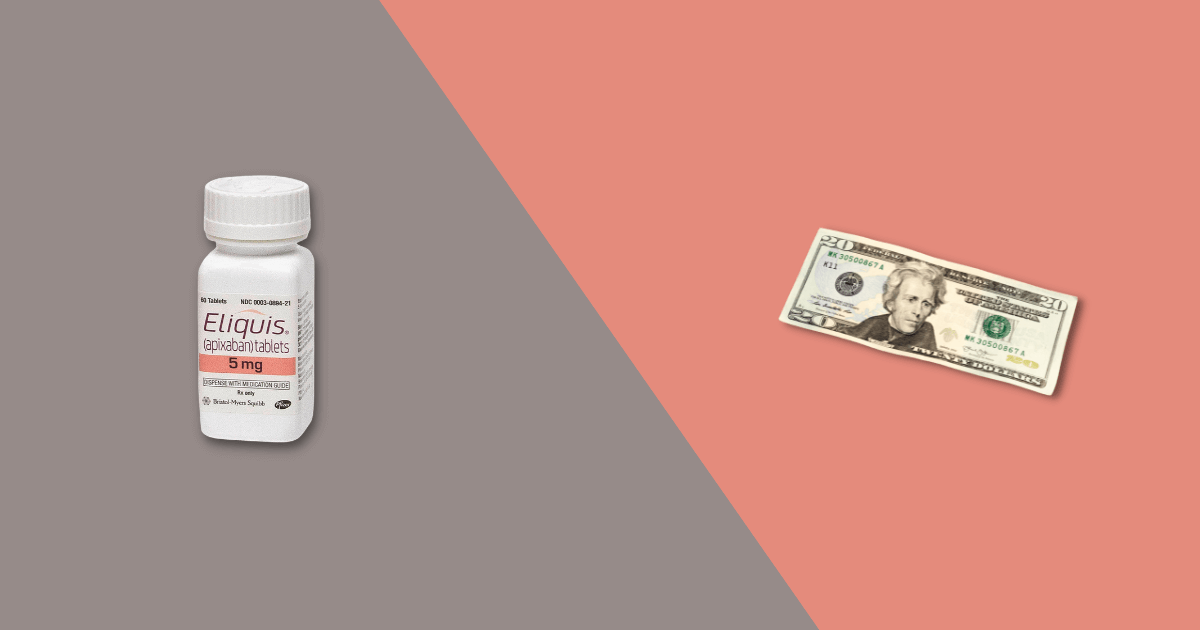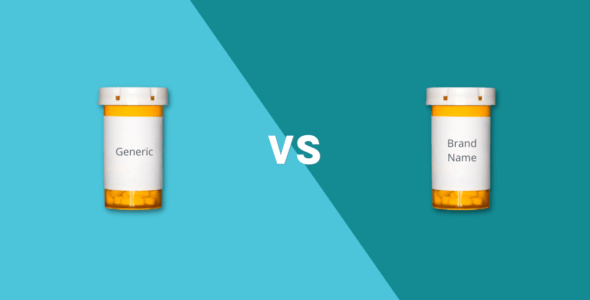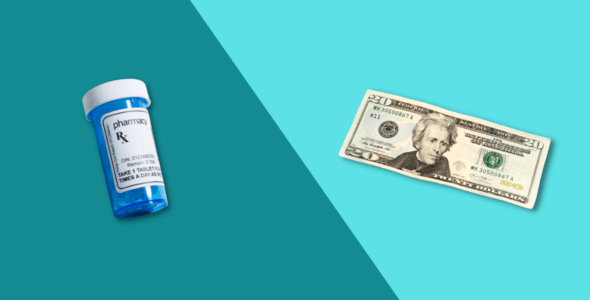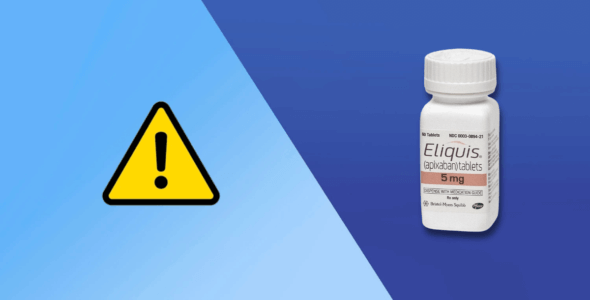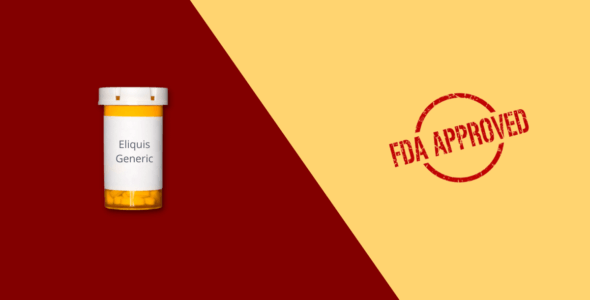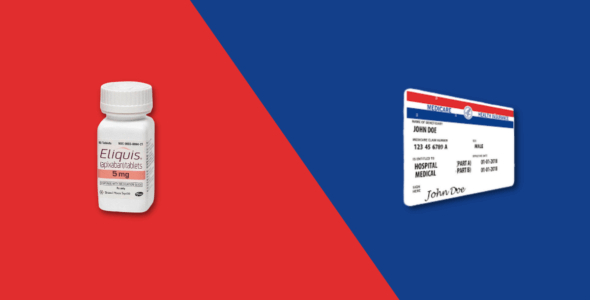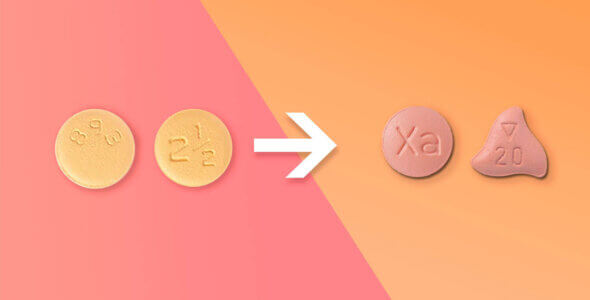Why is Eliquis so expensive?
Table of contents
Eliquis (apixaban) is a prescription medication that works by blocking certain clotting proteins in the blood, which prevents clots from forming. It is an expensive drug with a list price of $529 for a 30-day supply. Learn more about why Eliquis is so expensive and what options are available to help you save money.
What is Eliquis (apixaban)?
Eliquis is an FDA-approved brand-name medication with the active ingredient apixaban, and is part of a class of drugs called anticoagulants (Xa inhibitors) that are also known as blood thinners. It is used for:
- reducing the risk of stroke and blood clots in people who have atrial fibrillation (AFib), a type of irregular heartbeat
- treating blood clots in the veins of the legs (deep vein thrombosis – DVT) or lungs (pulmonary embolism – PE), and reducing the risk of them occurring again
- reducing the risk of forming a blood clot in the legs (DVT) and lungs (PE) of people who have recently had hip or knee replacement surgery
The FDA approved Eliquis from manufacturers Bristol Myers Squibb and Pfizer in December 2012.
Other popular anticoagulants include Xarelto (rivaroxaban), Pradaxa (dabigatran) and Savaysa (edoxaban).
Eliquis side effects
Like most medications, Eliquis may cause side effects. The most common side effects of Eliquis include bleeding, spinal or epidural blood clots (hematoma), and a possible reaction to Eliquis itself.
You may have a higher risk of bleeding if you take this medication with other medicines that increase your risk of bleeding, such as aspirin, nonsteroidal anti-inflammatory drugs (NSAIDs), warfarin, heparin, selective serotonin reuptake inhibitors (SSRIs) or serotonin-norepinephrine reuptake inhibitors (SNRIs) and other medicines that are used to help treat or prevent blood clots.
To avoid drug interactions with Eliquis, talk to your doctor or pharmacist about all of your medical conditions and any other prescription medications, over-the-counter products, vitamins or supplements you are taking. If you experience any side effects or possible signs of an allergic reaction, speak with your healthcare provider right away.
RELATED: Eliquis side effects and how to avoid them
How much does Eliquis cost?
The cost of Eliquis will depend on your health insurance company’s plan and the coverage for this drug including the copay and deductible. Medicare usually covers Eliquis through Medicare Advantage Part C or Medicare Part D prescription drug coverage plans.
According to the manufacturer’s website, individuals with commercial insurance pay $45 per month for Eliquis, and 5 out of 10 people pay $15 per month or less.
People who have a health insurance plan that includes coverage through Medicare are paying $46 per month on average, and 5 out of 10 people pay $30 or less.
Low-Income Subsidy patients may pay $0 to $9.85 per month when using the Social Security Administration’s Extra Help program.
Those who are covered under Medicaid pay $4 per month on average, and 5 out of 10 people pay $0.
For patients without prescription drug insurance who need to pay the list retail price, the estimated out-of-pocket cost for a 30-day supply of this medication is $529, according to the manufacturer’s website.
Get your Eliquis medication for only $49 per month
Get StartedGeneric Eliquis is not yet available
Eliquis is a brand-name medication and there are currently no generic Eliquis alternatives available. Generic medications are chemically equivalent to their brand-name counterparts and are sold at a lower cost. Once the generic of Eliquis is available for sale, the generic drug cost for apixaban will be much more affordable than the brand name Eliquis.
The patents for Eliquis expire on April 2028, which is the earliest date when a generic alternative will become available.
The FDA (U.S. Food and Drug Administration) requires generic drugs to be as safe and effective as their brand-name drug counterparts. Generic drugs are also subject to the same manufacturing quality standards as brand-name drugs. They must have the exact same active ingredient, strength, dosage form, route of administration, and indications for use.
As multiple generic drug companies will likely sell the generic version of the drug after the patent expires, the increase in competition will likely lower the cost of the medication so it will become more affordable for patients.
RELATED: Brand vs generic drugs, FDA approves first generic Eliquis, apixaban
Patent laws
Once a new drug is approved, the pharmaceutical company is granted a 20-year patent to sell the drug exclusively. For medications that are used to treat rare diseases which affect 200,000 or fewer people in the United States, the Orphan Drug Act extends the patent protection by an additional seven years.
During this patent protection period, the pharmaceutical company has exclusivity for the sale of the drug which is intended to allow the company to recoup the research and development investment that was required to discover the drug. After the patent for the drug expires, other pharmaceutical companies can request authorization from the FDA to start selling generic versions of the drug.
The patents for Eliquis will expire on April 2028, which is the earliest date a generic pharmaceutical company will be able to apply for FDA authorization to sell a generic version of Eliquis.
Unregulated pricing for pharmaceuticals
Americans pay the highest prescription drug prices in the world. In contrast with other developed countries like Canada, pharmaceutical pricing isn’t regulated in the United States, which means that drug companies can charge whatever they want for their medications in an attempt to incentivize drug companies to invest in developing new drugs.
A study by RAND analyzed prescription drug prices in the United States and concluded that prescription drug prices are on average 2.56 times higher in the US than in other OECD countries. Another study by AARP concluded that the annual increases in pharmaceuticals in the United States have continuously outpaced the rate of inflation.
How do I save on Eliquis (apixaban)?
The expensive price of Eliquis can make this medication unaffordable for many people, especially those without prescription drug insurance. Fortunately, there are several options to help you save money:
- Eliquis Copay card and free-trial offer – the manufacturer provides a savings card to people who meet the eligibility requirements. You can pay as little as $10 for a 30-day or 90-day supply of Trintellix. The maximum savings are $100 for a 30-day supply or $300 for a 90-day supply. Make sure to check the terms and conditions on the manufacturer’s website to determine if you are eligible as this offer may change.
- Patient assistance programs – you may be eligible for enrollment into a patient assistance program for Eliquis.
- Ask your healthcare professional if they can provide free Eliquis samples – the manufacturer may also provide your healthcare provider with free Eliquis samples.
- Get medical advice from your healthcare provider and find out if there are any alternative medications that can help you save money – find out from your prescribing doctor if there are any Eliquis alternatives that can work for you.
- Shop around at mail-order pharmacies – medication prices vary by pharmacy so it’s always a good idea to check prices at multiple pharmacies when purchasing your medication.
- Eliquis coupons – you may be able to find an Eliquis manufacturer coupon that can help you save more money.
- Help from Medicaid – find out if there is a state Medicaid plan available that may help cover the cost of your Eliquis prescription.
Medically reviewed
A medical professional has reviewed this article.


Jamie Winn, PharmD
Jamie Winn, PharmD
Dr. Jamie Winn received his Doctor of Pharmacy in 2002 from the University of South Carolina College of Pharmacy, Columbia, SC. Jamie is a medical reviewer for NiceRx.

